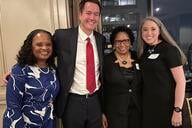You have /5 articles left.
Sign up for a free account or log in.
Technology moves at lightning speed, Facebook’s algorithm has new rules daily and marketing strategies are ever-evolving as the audiences we all seek to reach become increasingly fragmented. And yet, some of us find ourselves in workplaces where the prevailing sentiment is don’t rock the boat—if it worked in the past, let’s not make any major changes.
If the culture at your college is all about not fixing what’s not broken, you may have a challenge ahead of you as you try to suggest and implement some needed change. Turn that challenge into an opportunity with these tips for shaking things up in a change-averse environment:
Start small – If you try to do too much, you’ll encounter resistance and nothing at all will happen. If you set your sights on a bite-size initiative that could have a large impact, you’ll have much more success convincing the powers that be to let you give it a whirl. If your school is fond of print publications, for example, and you believe digital is the way to go to reach today’s students, don’t recommend scrapping the whole portfolio of materials. Start with a newsletter and grow from there. If you’re launching social media platforms, pick one or two that you know are used by the potential students and parents you want to reach. Set up a few accounts and have a clear idea of your goals and the strategies you’ll employ to achieve them. Communicate those to your superiors so they understand the point of the effort.
Show data – Everyone wants to accomplish institutional goals and get ahead, even those who resist change. So when you implement that small change, be sure to measure the outcome. Know where you are at the outset and build in a metric that will enable you to quantify how much you move the needle, how many people engage with your content, how many conversions are made. Then it’s not your opinion—it’s simply what the data shows is working to help the team reach its goals. When it comes to social media, use analytics to show what you learned about your audience’s preferences and how you’re shaping future content to match their needs. Show percentage increases from your starting point and no one will argue with success.
Share the credit – When there’s failure, everyone points fingers. If you’ve been successful, everyone wants a piece of it, so why not be magnanimous and let them take some credit? Recognizing the senior execs who green-lighted the project will ensure that they’ll give you opportunities to continue making positive changes. Thanking those staffers who report to you for doing the work will ensure that they continue to do the work as you develop new strategies to move your organization forward.
Don’t be afraid to make mistakes – It’s easy to get paralyzed by “what ifs?” and go down the doom-and-gloom road of anticipating failure, but there’s always something to learn from rolling up your sleeves and getting your hands dirty. When mistakes are made, you can analyze what happened and tweak the strategy for next time. If you follow rule #1 and start small, the stakes won’t be so high and you’ll still get a chance to try again, this time with some key takeaways under your belt. .
Stay current in the field – Just because it seems others may not be keeping up to date with new trends doesn’t mean you shouldn’t. Go to professional conferences, meet colleagues and peers and learn the state of the state. You’ll be able to bring back valuable lessons each time you go and your vistas will be expanded. If you implement small but significant ideas you’ve absorbed at these events, you’ll be taking your game up a notch and making everyone look better.
As professionals, we all want to keep growing, to create a learning culture for our staff and incorporate best practices into our work. While Rome wasn’t built in a day and an organizational culture can’t be overhauled in a week, the tips above can help you make small but meaningful changes that will improve performance, drive results and pave the way for future change.
Ellie Schlam is Executive Director of Communications and Marketing at the Touro College and University System.




